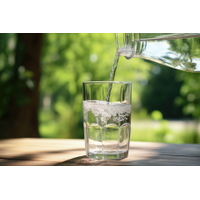* Only visible on admin mode.
Data Layer Value
Value
DataLayer - GTM_Page_Type
DataLayer - GTM_page_category
Front Row MD ID

Content
Author
Reviewed by
Date
Category
Tags
The Ultimate Guide to Hydration: Why Water is Crucial for Your Health
Immunity, Lifestyle, Longevity


November 29, 2024
Shana Reed
Introduction
Introduction

Water is often called the "elixir of life" for a good reason. It is a vital nutrient that sustains almost every aspect of our body's functioning.
Hydration is crucial in maintaining overall health and well-being, ranging from activity at the cellular level to direct activity of the organ systems.
Yet, the importance of hydration is often underestimated until its absence is felt, either through dehydration or overhydration.
Did you know that even a 2% drop in hydration levels can lead to noticeable declines in physical and cognitive performance?
This article will delve into the science of hydration, its numerous health benefits, the risks associated with inadequate hydration, and offer practical advice on staying hydrated.
The Science of Hydration
The Science of Hydration
Composition and Function
Composition and Function
Water is about 50-60% of the composition of the human body, depending on age, sex, and body structure.
This range may vary slightly according to different health sources. Water is the principal chemical component of every cell, tissue, and organ, ensuring that all bodily systems function efficiently.
Water helps regulate body temperature, supports digestion, transports nutrients, and is involved in metabolic processes, including energy production and nutrient absorption.
Without sufficient water, these processes slow down compromising physical health and cognitive abilities.
Daily Fluid Needs
Daily Fluid Needs
The amount of water each person needs varies. Still, according to the National Academy of Medicine, general guidelines recommend approximately 2.7 liters (about 11 cups) per day for women and 3.7 liters (about 16 cups) for men.
This includes drinking water and fluids from food sources like fruits and vegetables.
Activity level, climate, and individual health can also impact hydration requirements.
For example, an active person in a hot environment will need more fluids to compensate for sweat loss.
According to recent hydration studies, a more personalized approach is to drink roughly half an ounce of water per pound of body weight, or more if you are highly active or in a hot climate.
Benefits of Staying Hydrated
Benefits of Staying Hydrated

Physical Health Benefits
Physical Health Benefits
Staying properly hydrated yields numerous physical health benefits:
Body Temperature Regulation: Water helps regulate body temperature through sweating and respiration, preventing overheating, especially during physical activity or in hot climates.
Joint Lubrication and Organ Protection: Water lubricates the joints and cushions vital organs, such as the brain and spinal cord, ensuring they function smoothly.
Digestive Health: Water aids in forming saliva, which is essential for breaking down food and kick-starting the digestive process. Softening stool with water helps prevent constipation.
Kidney and Urinary Health: Proper hydration helps prevent kidney stones and supports the urinary tract by flushing out waste products, such as urea and excess salts, which is crucial for maintaining kidney health.
Toxin Elimination: Water helps remove toxins through urine, sweat, and bowel movements, playing a key role in detoxifying the body.
Immune Support: Hydration supports immune function by maintaining mucosal barriers and aiding lymphatic circulation, which helps the body fight infections.
According to research, adequate water intake keeps mucous membranes moist, providing a line of defense against pathogens.
Cognitive and Emotional Benefits
Cognitive and Emotional Benefits
Hydration impacts more than just physical health; it also plays a significant role in mental well-being.
Proper hydration can enhance cognition, stabilize mood, and improve sleep quality. Dehydration can lead to fatigue and poor concentration by impairing blood flow and decreasing oxygen supply to the brain, which impacts cognitive function.
Hydration is also crucial for neurotransmitter production, affecting mood regulation and cognitive function.
Cardiovascular Health
Cardiovascular Health
Proper hydration is essential for maintaining optimal blood viscosity, which helps the heart pump blood efficiently.
According to recent cardiovascular health studies, dehydration reduces blood volume, putting additional strain on the cardiovascular system and potentially increasing the eventual risk of high blood pressure.
Athletic Performance
Athletic Performance
Staying hydrated can significantly impact the performance of athletes.
Hydration improves endurance, prevents excessive rise in body temperature, and reduces the risk of cardiovascular injury during exercise, supporting optimal athletic performance.
Proper hydration ensures muscles receive adequate oxygen, allowing them to function efficiently.
For example, endurance runners must maintain hydration to prevent fatigue, while weightlifters require hydration to support muscle contraction and strength.
Risks of Dehydration
Risks of Dehydration

Symptoms and Effects
Symptoms and Effects
Dehydration can manifest in several ways. Mild symptoms include thirst, dry mouth, fatigue, and headaches.
However, severe dehydration can lead to dizziness, confusion, rapid heart rate, and even heatstroke.
Chronic dehydration can have serious implications for kidney health and cardiovascular function, increasing the risk of kidney disease and other chronic conditions.
Vulnerable Populations
Vulnerable Populations
Certain groups are more susceptible to dehydration. Older adults often experience a reduced sense of thirst, making it easy to become dehydrated without realizing it.
This age-related change, combined with certain medications, can increase the risk of dehydration.
Athletes, those who exercise vigorously, and individuals living in hot climates are also at higher risk due to the increased loss of fluids.
Children are also vulnerable to dehydration because of their higher surface area-to-body mass ratio, which leads to faster fluid loss.
The Dangers of Overhydration (Hyponatremia)
The Dangers of Overhydration (Hyponatremia)
While dehydration is a common concern, overhydration, or hyponatremia, is also a significant health risk.
This condition occurs when excessive water intake dilutes sodium levels in the blood to dangerous levels.
Causes and Symptoms
Causes and Symptoms
Overhydration often occurs in athletes who drink excessive amounts of water during prolonged exercise without balancing their water intake with electrolyte intake.
It can also occur during water-drinking contests or due to an overzealous approach to hydration.
Hyponatremia symptoms can range from mild issues like nausea and muscle cramps to severe symptoms such as confusion, seizures, coma, and, in rare cases, death, as indicated by medical research.
Athletes and those at risk should consume electrolyte-rich fluids in addition to water to prevent hyponatremia.
Prevention Tips
Prevention Tips
To avoid overhydration, it is best to drink water according to your body's thirst cues. A good rule of thumb is to avoid consuming more than one liter of water per hour.
Monitoring your urine color can also help gauge hydration status—light yellow indicates optimal hydration.
Myths and Misconceptions About Hydration
Myths and Misconceptions About Hydration

The "Eight Glasses a Day" Myth: The standard advice of drinking eight glasses of water daily may not apply to everyone, as individual fluid needs vary based on age, weight, and activity level.
Caffeinated Beverages Count: Contrary to popular belief, caffeinated beverages like coffee and tea can contribute to your daily fluid intake, although excessive caffeine can have a mild diuretic effect, according to recent studies. However, moderation is key.
Sports Drinks Are Not Always Necessary: Sugary sports drinks are often unnecessary and can lead to excessive sugar intake for non-athletes. Water or electrolyte solutions are better suited for most individuals.
Alcohol and Hydration: Alcohol, being a diuretic, contributes to dehydration by promoting increased urine production, as noted by health authorities like the Mayo Clinic. Drinking water alongside alcoholic beverages can help maintain hydration.
Practical Tips for Staying Hydrated
Practical Tips for Staying Hydrated
Morning Routine: Start your day with a glass of water to replenish fluids lost overnight.
Hydrating Foods: Incorporate hydrating foods like watermelon, cucumbers, oranges, and spinach into your diet. These foods not only hydrate but also provide essential vitamins and minerals.
Reusable Water Bottle: Carrying a reusable water bottle encourages regular daily sipping.
Adjust to Conditions: Increase fluid intake based on activity level, environment, and health status.
Check Urine Color: Use urine color as an indicator of hydration—light yellow is ideal, while darker shades indicate a need for more water.
Use Hydration-Tracking Apps: For those who struggle to drink enough water, using hydration-tracking apps or setting reminders can help maintain consistent fluid intake.
Special Considerations
Special Considerations

Illness: During illness, particularly with fever, vomiting, or diarrhea, fluid needs will increase significantly to compensate for the loss.
Older Adults: Hydration is particularly important for older adults or those with chronic conditions like diabetes or kidney disease, as they are more vulnerable to dehydration. Research suggests that individuals with diabetes should be especially mindful of their fluid intake, as high blood sugar can lead to increased urination and a higher risk of dehydration.
Athletes: Athletes engaging in prolonged exercise should focus on maintaining electrolyte balance and hydration to prevent hyponatremia.
Conclusion
Conclusion
Hydration is fundamental to optimal health, impacting physical performance and cognitive function.
However, it is important to strike a balance—dehydration and overhydration can have serious consequences.
Staying mindful of your body's hydration cues, adjusting fluid intake based on your individual needs, and understanding the risks associated with improper hydration are all key to achieving and maintaining good health.
Remember to drink consciously, eat hydrating foods, and listen to your body—it's the best guide to staying well-hydrated.
Track your hydration over the next week and notice the effects on your physical and mental well-being.
Try using a hydration-tracking app to make it easier.


-
Latest Posts
-
-
The Power of Fiber: Why Your Body Loves It and How to Get More
-
Know Your Oats: A Comprehensive Guide
-
5 Steps to a Healthier You
-
Advancing Health with GLP-1: Innovations, Applications, and Future Directions
-
Understanding and Managing Urinary Tract Infections (UTIs): Prevention, Treatment, and Complications
-
-
Contacts
Contacts
967 E. Parkcenter Blvd #345
Boise, ID 83706
7 A.M. - 3 P.M. MST, Mon - Fri
(833) 332-8655
support@clinicaleffects.com
THE STATEMENTS MADE ON OUR WEBSITES HAVE NOT BEEN EVALUATED BY THE FDA (U.S. FOOD & DRUG ADMINISTRATION). OUR PRODUCTS ARE NOT INTENDED TO DIAGNOSE, CURE OR PREVENT ANY DISEASE. CLINICAL EFFECTS IS NOT AFFILIATED WITH ANY OF THE STUDIES MENTIONED ON THE WEBSITE. THE TESTIMONIALS ON THIS WEBSITE ARE INDIVIDUAL CASES AND DO NOT GUARANTEE THAT YOU WILL GET THE SAME RESULTS.
© All Rights Reserved 2021







